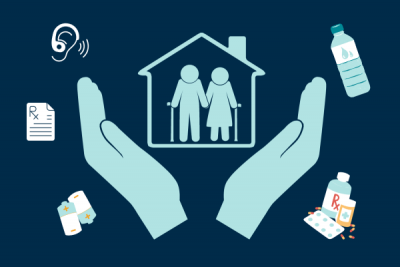Older Adults Preparation
While everyone is at risk during a natural disaster or emergency, older adults can be especially vulnerable. Your family’s emergency planning should consider mobility issues, isolation, and any health conditions requiring medications, special diets, assistive devices, or other treatments.
Every step taken to prepare now makes older people more resilient when disaster strikes. Wilsonville Ready provides some simple, low-cost steps for older adults (and those who care for them) can take to be better prepared for an emergency:
- Consider how medical, physical, and cognitive needs may affect each person’s ability to respond to an emergency.
- Create an emergency plan that includes any special assistance that may be needed.
- Identify and keep an up-to-date contact list of family, friends, neighbors, caregivers, and care providers who may be able to assist during an emergency.
- Especially during an emergency, when families can get separated, it’s in everyone’s best interest to have a support team to help care for a loved one in need of assistance. This team can include family members, neighbors, friends, neighborhood groups, faith-based groups, health care providers, service providers, and social service organizations.
- Plan ahead with members of this support network to provide assistance in the event of an emergency. To consider in this planning:
- How you will communicate with each other before, during, and after an emergency?
- How do a loved one’s (or your own) medical, physical, or cognitive needs factor into any response to an emergency?
- How can medical equipment be operated if electricity goes out?
- How will they get the medicine or medical treatment they need in an emergency?
- What transportation options are available? How, and to where would your loved one evacuate?
- Consider how to communicate with older adults during an emergency.
- Plan ahead for transportation needs should evacuation become necessary.
- Personalize emergency kits to meet each individual’s needs, including special dietary requirements, medicines, medical supplies, batteries, and chargers.
- Include updated medical information in your emergency kit. Include health conditions, allergies, medications with dosages, prescription records, doctors, Medicare, and other proof of insurance.
- Plan how to ensure that assistive devices (like walkers, wheelchairs, hearing aids and eyeglasses) are brought during an evacuation.
- Individuals who undergo routine treatments at a clinic or hospital should consider emergency plans and those facilities, and work with them to identify back-up service providers.





